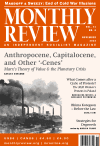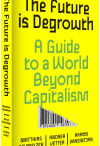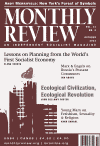Ecology

The Half-Earth movement calls for rewilidng half the earth as a means of combating the planetary crisis. Brian Napoletano explores the implications of the Half-Earth approach as outlined Vettese and Pendergrass’s Half-Earth Socialism. | more…

This month’s “Notes from the Editors” marks the 30-year anniversary of the United Nations Framework Convention on Climate Change. The abject failure of this framework to enact meaningful progress on the planetary crisis continued to be on full display in 2022, including at November’s COP27 in Egypt. | more…

This issue’s Review of the Month discusses Marx’s role as the foremost revolutionary critic of bourgeois Enlightenment humanism. To this day, his conception of “the universal metabolism of nature” remains a powerful antidote to the phantasmagoric “dark ecology” posited by today’s posthumanism. | more…

John Bellamy Foster takes readers back to Marx’s understanding of the dialectics of nature and society. As Marx and Engels noted, humanity must not only struggle for the advancement of human freedom, but also the capitalist destruction of the earth. Today, the struggle for freedom and the struggle for necessity coincide everywhere on the planet for the first time in human history, creating a prospect of ruin or revolution. | more…

The latest Review of the Month, written by Spanish geologist Carles Soriano, considers the implications of idea of the Capitalocene, the historical determinations affecting the study of the Earth Sciences, and how our views of the current planetary crisis are often shaped by inadequate narratives. Current approaches, he writes are “non-dialectic and non-materialist regarding the study of social reproduction modes, and this renders the whole understanding of the planetary crisis not only incomplete but idealist, for the capitalist mode is assumed as absolute rather than historical.” | more…

The perception that we are living in a critical historical period regarding the conditions of habitability on Earth—not only for humans but for many other living organisms too—is gaining more and more adepts among common people, academics, politicians, and social movements. This critical period has been typified as the planetary crisis of the Anthropocene Epoch and studies undertaken in the present century show that habitability on Earth is progressively deteriorating. | more…

Mariko Frame reviews The Future is Degrowth: A Guide to the World Beyond Capitalism, by Matthias Schmelzer, Andrea Vetter, and Aaron Vansintjan (Verso, 2022) and its explorations of the policies, vision, and strategies for social change required for the burgeoning movement. | more…

This year is the fiftieth anniversary of The Limits of Growth, one of the most influential, and also controversial, environmental studies ever written. No other environmental work of the 1970s offered such a direct challenge to the underlying assumptions of capitalist neoclassical growth economics, or was responded to so vehemently by establishment thinkers. | more…

An Ecological Marxist Perspective
How are we to understand the origins and historic significance of the concept of ecological civilization? What is its relation to ecological Marxism? And how does all of this relate to the worldwide revolutionary struggle aimed at transcending our current planetary emergency and protecting what Karl Marx called “the chain of human generations”—along with life in general? | more…

Our current geological time period, characterized by drastic planetary shifts due to anthropogenic climate change, is popularly known as the Anthropocene Epoch. Recent proposals for naming the first age of this epoch highlight capitalism’s central role in the ongoing climate crisis. | more…

More than twenty years after the publication of John Bellamy Foster’s Marx’s Ecology (2000), ecosocialist scholars continue to explore the evolution of Marx’s ecological thinking, from the Greek atomists to his later work on ethnology. | more…

John Bellamy Foster’s recent work, The Return of Nature, makes a strong case that Marxism’s central, materialist conception of nature and history makes it the best possible theoretical basis for radical ecological scholarship. | more…











